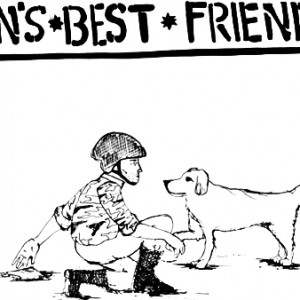Currently, the suicide rate for veterans in the United States is higher than the rate of troops killed in combat. For my undergraduate research, I looked at how dogs that are specially trained to help veterans cope with Post-Traumatic Stress Disorder may bring peace of mind to those suffering and could even replace or supplement costly psychological medications.

The VA estimates that 20 percent of Iraq and Afghanistan War veterans, 10 percent of Gulf War veterans and 30 percent of Vietnam War veterans experience PTSD. This amounts to about 300,000 to 400,000 people in the U.S.
PTSD is primarily treated with psychotherapy, if it is treated at all. However, an emerging field for the treatment of PTSD is animal therapy. Animal therapy includes service animals that are specifically trained to accompany their human companion into all public places, therapy animals who visit individuals in nursing homes and hospitals and pets who are part of a human family.
Research on the effects of pet owning and animal interaction indicates positive health results. Interacting with animals is correlated with improved mood, lower blood pressure, a drop in the stress hormone cortisol, increases in the positive-mood hormone serotonin an d positive lifestyle changes, such as an increase in exercise, responsibility and socializing. These same results can be seen with veteran. Further, when animals are specifically trained to interact with veterans with PTSD, the results are amplified.
My research has revealed thus far that animals, specifically dogs, who are specially trained to aid veterans in everyday life can have a significant positive effect. These dogs can sense the changes in human moods and therefore react to anxiety attacks and bad dreams. Dogs are trained to lead their veterans out of a crowd, wake them up from nightmares, provide stability if the veteran is dizzy and provide comfort during distress.
While living with a service dog can benefit those suffering from PTSD, there are downsides as well. PTSD qualifies as an invisible disorder, meaning that the effects of the condition are not immediately identified visually. This means that some veterans experience discrimination when they are accompanied by a service dog, because business owners and other members of the public may doubt that the veteran is truly disabled. Also, there is an added cost of financially supporting a dog with food and veterinarian bills. However, all veterans interviewed so far say that the benefits outweigh the costs. One veteran reported that having his dog with him was often better than the medication the VA gave him.
Results from my interviews and research indicate that these dogs represent lifelines for veterans with PTSD. They provide a nonjudgmental outlet for telling war stories and secrets and in many cases can serve as a replacement or supplement for psychological medications.
Hannah Antonson is senior anthropology major at Ithaca College. Email her at [email protected].







